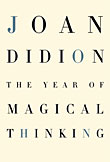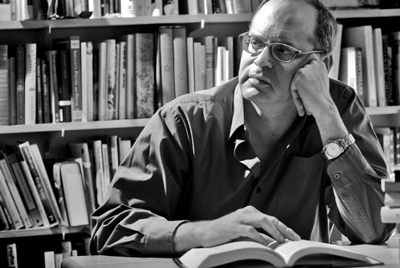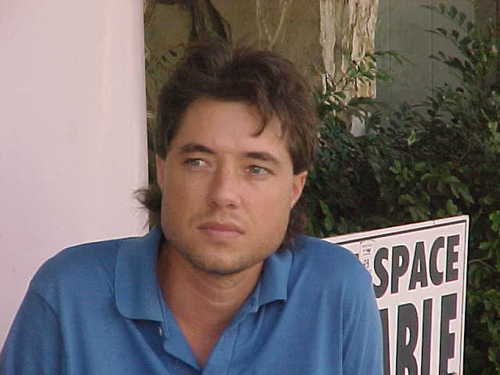March 12, 2006
The New-Now

I'm enthusiastic about PodCasting. It's great in the studio, specific radio content on demand. In a future post, I'll list my favorites, but for now I wanted to mention a Bookworm PodCast interviewing Joan Didion. This, an excerpt from KCRW's excerpt from Didion's recent Year of Magical Thinking:
Chapter One1.
Life changes fast.Life changes in the instant.
You sit down to dinner and life as you know it ends.
The question of self-pity.
Those were the first words I wrote after it happened. The computer dating on the Microsoft Word file ("Notes on change.doc") reads "May 20, 2004, 11:11 p.m.," but that would have been a case of my opening the file and reflexively pressing save when I closed it. I had made no changes to that file in May. I had made no changes to that file since I wrote the words, in January 2004, a day or two or three after the fact.
For a long time I wrote nothing else.
Life changes in the instant.
The ordinary instant.
At some point, in the interest of remembering what seemed most striking about what had happened, I considered adding those words, "the ordinary instant." I saw immediately that there would be no need to add the word "ordinary," because there would be no forgetting it: the word never left my mind. It was in fact the ordinary nature of everything preceding the event that prevented me from truly believing it had happened, absorbing it, incorporating it, getting past it. I recognize now that there was nothing unusual in this: confronted with sudden disaster we all focus on how unremarkable the circumstances were in which the unthinkable occurred, the clear blue sky from which the plane fell, the routine errand that ended on the shoulder with the car in flames, the swings where the children were playing as usual when the rattlesnake struck from the ivy. "He was on his way home from work-happy, successful, healthy-and then, gone," I read in the account of a psychiatric nurse whose husband was killed in a highway accident. In 1966 I happened to interview many people who had been living in Honolulu on the morning of December 7, 1941; without exception, these people began their accounts of Pearl Harbor by telling me what an "ordinary Sunday morning" it had been. "It was just an ordinary beautiful September day," people still say when asked to describe the morning in New York when American Airlines 11 and United Airlines 175 got flown into the World Trade towers. Even the report of the 9/11 Commission opened on this insistently premonitory and yet still dumbstruck narrative note: "Tuesday, September 11, 2001, dawned temperate and nearly cloudless in the eastern United States."
"And then-gone." In the midst of life we are in death, Episcopalians say at the graveside.
Michael Silverblatt is an intense interviewer, my gold standard for considering creative work either in a studio visit or in a blogpost. He gets in tight and slows down, bearing in hard on the core of the creative life of his guest. His research is intimate and searing in a most caring and careful way. He must sidle up to the miicrophone superclose, I can imagine what it must be like in the studio with him.
Most formal critiques can have a interrogatory feel to it, an inquisition, an official investigation, a courtroom. Silverblatt is an empath (a favorite word/concept of mine I guess... I sense a repetative tic), a Sensei, a Rabbi, a brother... witness his voice and perhaps you can hear what I do: an intimacy with hat in hand as he gently but forcibly unfolds the thinking of his (artist) guest.

(Source)
UPDATE:
Looking over the Google Search page on Silverblatt, I find Luke Ford's opinion on the worth of my favorite Lit. interviewer.
Searing:
7/28/05I listened to the KCRX show for the first time today to hear Tom Wolfe interviewed. It was awful radio. Michael can take a minute or longer to pose an awkward, pause-ridden question. There's so much dead air. Michael is to talk radio what the Special Olympics are to the Olympics. Listening to Silverblatt, I'm filled with the same awkward compassion I feel for a heavily retarded kid trying to run down a track and repeatedly falling on his face.
Am I an idiot or is this Scott Martelle LA Times article on Silverblatt's show idiotic? There's nothing in it I can hold on to. It's empty words about an empty show. If you can figure out what this article means, please Email Luke.
In particular, could someone please explain this paragraph:
The series is an ambitious effort to engage some of the nation's leading writers ? and a few emerging writers like Mart?nez and David Mitchell, author of "Cloud Atlas" ? in a far-ranging discussion of the nature of self in literature, both as a catalyst for the author and as a motivation for the reader.Then could you explain this: "The programs are vintage Silverblatt, whose low-key but intensely informed approach to interviewing often leads writers to on-air revelations about their own work."
What's low key about Silverblatt bloviating for over a minute trying to form a question? Why does Silverblatt have to lecture these authors about the meaning of their books? Why does The LAT puff up this nonsense?
Silverblatt named the series "Escaping the Cage: Identity, Multiculturalism and Writing," playing off Angelou's autobiography, "I Know Why the Caged Bird Sings," which, in turn, was named for her poem about the human desire to make one's voice heard even when shackled.Anything titled after anything Maya Angelou has written is likely to be nonsense. There are some voices that should be shackled -- ok, that's too strong, and I don't really believe it, but my shackling tendency just overcame my better self. Why must I get angry before I can blog?
The funny thing is, I like both Luke Ford and Michael Silverblatt. Luke's got a point here. The Maya Angelou interview, I didn't like either (because I didn't like Angelou or Silverblatt's fawning approach, too uncritical). But Silverblatt would have made sure he had spelled the name of the radio station correctly. After inspecting the links, you might conclude this is a Left/Right pissing contest, but a closer inspection of Luke's oeuvre will reveal that he's quite a rascal in the lofty, formal and ultimately (up)tight house of the Right. "Nearer My G-d To Thee" indeed. Personally, I don't believe in Right versus Left... like Painting, I believe in Abstraction plus Representation. That's why I like his work too.
I found Luke Ford's site through Cathy Siepp's blog (a very good writer here who lives in SilverLake), both I highly recommend.

As a matter of fact, I'll put them into the Soup of Links forthwith.
One last thought on the LukeFord/MichaelSilverblatt issue: who would you rather be: the rascal in the pews or the saint in the whorehouse?
Posted by Dennis at March 12, 2006 9:47 AM
Leave a comment